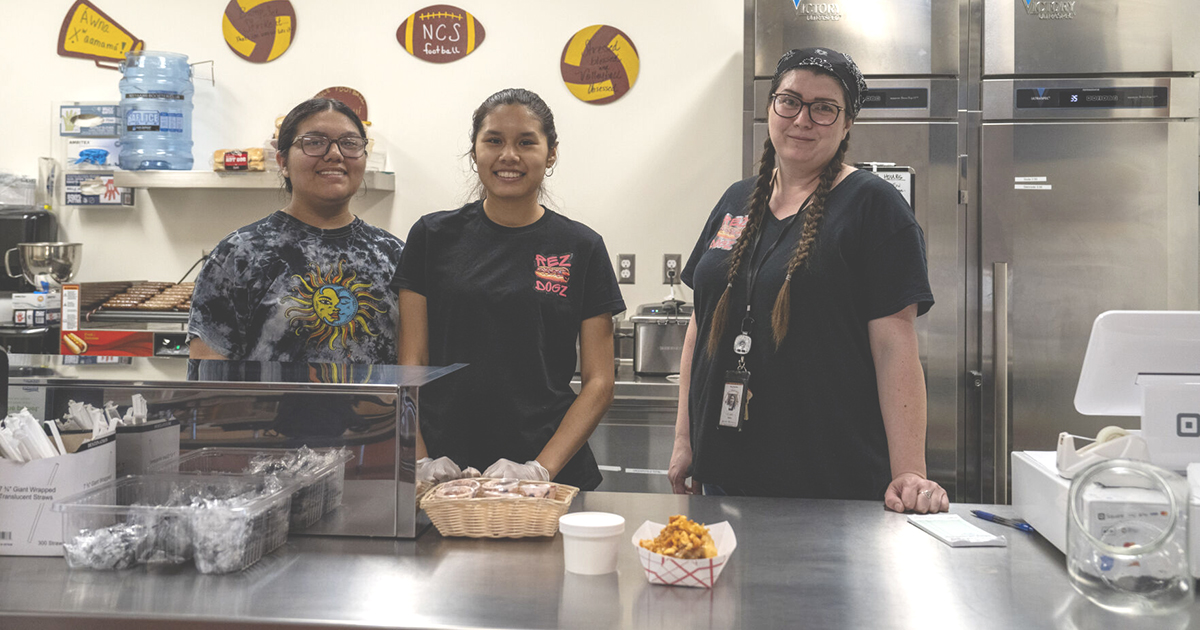By BERIT THORSON, East Oregonian
MISSION — Rather than sun and popsicles by the pool, summer break for a few Nixyáawíí Community School students consists more of hot dogs, fry bread and blueberry cobbler inside a small kitchen.
Rez Dogz, a pop-up restaurant housed inside Nixyáawíí Community School on the Confederated Tribes of the Umatilla Indian Reservation (CTUIR), serves First Foods-inspired recipes. It’s a grant-funded summer enrichment program through the school, with language arts teacher Nicci Harrison overseeing it and students volunteering to help it run smoothly.
“Basically the idea is just to teach them some skills that they could maybe use in the workforce later on,” Harrison said. “They do receive some elective credit for it, but mostly it’s just so they can have something different to do during the summer.”
Initially, they were going to serve out of a food truck in front of the school, but there was an issue with the trailer’s electricity, so right before their opening on June 26 they had to move inside.
Quick decisions and changes seem to be a theme with the restaurant. Harrison had less than two months to put the restaurant’s plan into action and recruit students to help after the grant was approved. She said she expects the money earned to go toward school trip scholarships, but said the exact plan hasn’t been decided yet.
Rooted in tradition
The concept for the project came to her a few years ago, she said, but it took a while to implement it, especially because she wanted to find interesting recipes that incorporated First Foods, or what Indigenous peoples were eating before contact with Europeans.
“We’re on a reservation and we were trying to be respectful of the traditions and acknowledge the culture that we’re within here,” she said. “I came up with the initial ideas for the menu, and then we fine-tuned together. I think, all in all, we came up with some pretty good stuff.”
The hot dogs come in five varieties, with a meat base of elk, bison, pheasant, venison or wild boar. Toppings and condiments include a Lakota berry sauce, cranberry mustard, apple slaw and Three Sisters chili made from beans, corn and squash. Additionally, the hot dogs can be served in a bun or on homemade fry bread.
One of the more popular hot dogs, the Wampanoag, tastes like Thanksgiving in a bun. Harrison said it helps to reclaim the Thanksgiving meal.
“There’s a lot of misconception around how the original Thanksgiving happened,” she said. “However, even today, when we do a Thanksgiving celebration here at the school for students, we serve Thanksgiving foods that people normally associate with Thanksgiving, but we wanted to put our own spin on it.”
Even the sides and drinks highlight Indigenous traditions or culture. Rez Dogz serves a dish called Auntie’s Potato Salad and a Rezy Lemonade with sumac and huckleberry.
A learning experience
Two of the students involved, rising NCS seniors Malana Spencer and Lauralee Stanger, said they have enjoyed the work so far. They were able to give feedback on the logo and menu, and once Rez Dogz opened, they have been helping to run the business.
“I feel like it’s a good learning experience and everything,” Spencer said. “It was pretty hard the first day, but we ended up getting through it fine.”
Stanger added that she liked seeing the people enjoying their food. On the final day of the first week, there was already a repeat customer.
Jack Burt, of Pendleton, grabbed lunch from Rez Dogz on June 27 and 28. He said initially, it “just looked interesting,” especially the fry bread, which he enjoyed. But what made him return was more than just the tasty food.
“It’s always good to see young people getting into this kind of stuff and getting excited about it,” Burt said. “You don’t want them to be discouraged, so yeah, it’s nice if you can support that.”
Rez Dogz, for now, is open three days a week for a few hours. Its last scheduled hours are in early July, though Harrison and her students hope to continue serving meals in some capacity after this initial stint.
- Republished with permission of the East Oregonian



